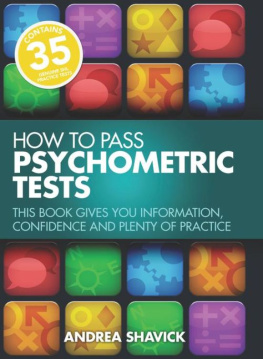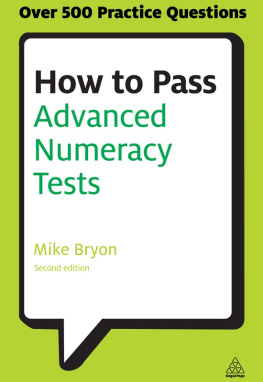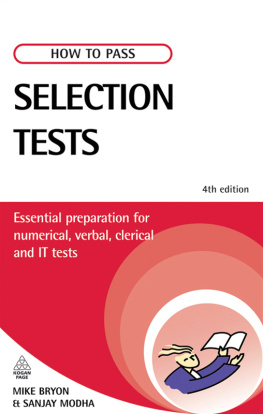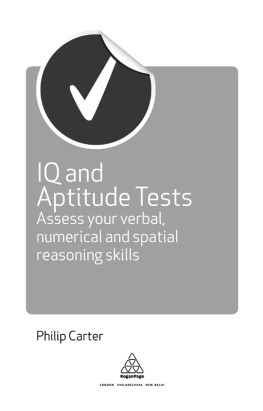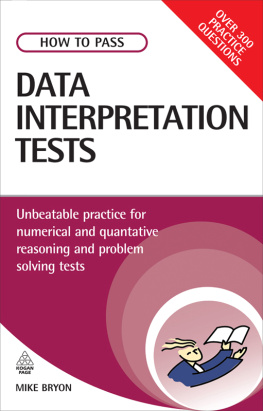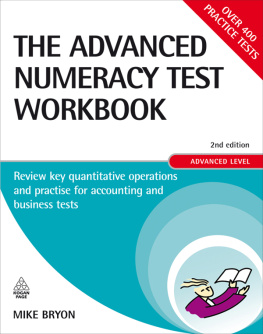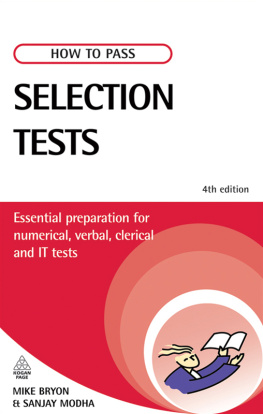There are three things you have to do if you want to pass a psychometric test.
No. 1 perhaps the most important thing of all, is dont panic. By the very act of buying this book youve already upped your chances of passing by a very long way. Familiarisation is the name of the game, and if you know 3what to expect, you can reduce the fear factor considerably.
No. 2 is slightly obvious (although not to everyone) and that is to practise. Its amazing how far you can improve your test scores with a bit of practice, especially if you havent taken many psychometric tests before.
No. 3 is to cheat. Well, not literally. Im not advocating taking binoculars into the test and stealing the other candidates answers (although it s rather an enticing idea). But what if you could find out in advance what youll be up against? What if you could find out exactly what type of test youll be taking and what the pass mark is? Surely that would give you the edge over all the other applicants?
Not cheating at all really. Actually it s extremely sensible, not to mention easy, and Im going to show you how to do it.
And because the whole point of this book is to familiarise you with the different types of test and give you the chance to practise (thereby helping you improve your performance) I include 35 practice tests!
These are not made up tests that you sometimes see in books about psychometrics, nor are they puzzles or quizzes of the magazine variety. They are genuine practice tests from the biggest test publisher in the world: SHL Group plc. This is the genuine article. This is the sort of thing youll be facing when you apply for a job with virtually any mediumlarge size company, irrespective of industry, whether private or public sector.
I have also given you information about the type of job (and the level) for which each test would be used, and tips on how to improve your performance with each category of test.
And if that isnt enough, Ive also included a whole chapter of resources in which I have listed internet sites where you can find even more practice material, together with a list of useful books.
My aim in writing this book is to give you both knowledge and experience, not just to survive, but to pass real live psychometric tests with flying colours. Job hunting can be stressful but not any more!
Psychometric tests are structured tests, taken in exam-like conditions, which aim to measure objectively a persons ability or certain aspects of their personality.
Most psychometric tests which measure ability, and virtually all accredited psychometric tests which measure aspects of personality, are devised by occupational psychologists. Their aim is twofold: to provide employers with a reliable method of selecting the best applicants, and to design tests carefully so that they are fair to all applicants.
All psychometric tests, except for personality tests, are strictly timed.
What do psychometric tests measure?
There are many different types of psychometric test. A common misconception is that psychometric tests only measure personality, but that is not the case.
Some measure your ability to understand the written word, or to reason with numbers. Others measure your ability to solve mechanical problems, or follow instructions accurately, or be able to understand data which is presented in a variety of ways. And then, of course, there are the personality tests, assessing everything from motivation to working preferences.
But psychometric tests cannot measure everything. For example, they cant really measure enthusiasm. Personally, I think that getting in on time every day and making an effort to do your best are to a large extent determined by how much you enjoy the actual work, how well you get on with your colleagues, and how decent your boss is. Perhaps they should invent a psychometric test for employers!
Who uses psychometric tests?
At the time of writing, well over 95% of the FTSE 100 companies use psychometric testing to select their staff, as do the police, the civil service, local authorities, the armed forces, the fire service, the National Health Service, financial institutions, retail sector companies, the motor industry, the IT industry, management consultants, airlines, the power industry the list is endless.
In fact, virtually every large or medium-sized organisation in the UK uses psychometric testing as part of their recruitment process, irrespective of industry. Furthermore, the use of psychometric tests is widespread in Europe, Australia and the USA.
And it doesnt matter what level of job you are applying for either. Psychometric tests are used to select all types of staff, everyone from the most junior positions to director level. One thing is certain, if you are looking for a job, you are more than likely to be asked to take a psychometric test.
As to the why they are used see the next chapter.
When will I have to take a psychometric test?
At any stage in the recruitment process, including first contact. These days many employers are so enthusiastic about psychometric tests, they put them on their application forms and websites.
The tests could also pop up later in the process, or even after youve been offered the job when your new boss is deciding exactly where in the organisation to place you.
How many tests will I have to take?
In theory, all psychometric tests given to job applicants should be relevant to the job. You should only have to take, for example, a spatial reasoning test if the job you are applying for requires good spatial skills.
However, many organisations use verbal, numerical and abstract reasoning tests as a matter of routine, no matter what the job description says. So be prepared to take more than one test.
Where will I have to go to take a psychometric test?
For both ability-type tests and personality questionnaires you could be examined at your potential new employers office, at an assessment centre, at an employment agency office or even in the comfort of your own home using your computer.
Note: assessment centre is HR (Human Resources/Personnel) jargon for getting candidates together either at the employers premises or an outside location and subjecting them to an intensive battery of different tests and exercises. These could include role playing, in-tray exercises, group exercises and discussions, presentations and of course, psychometric tests. For more detailed information, see my book

